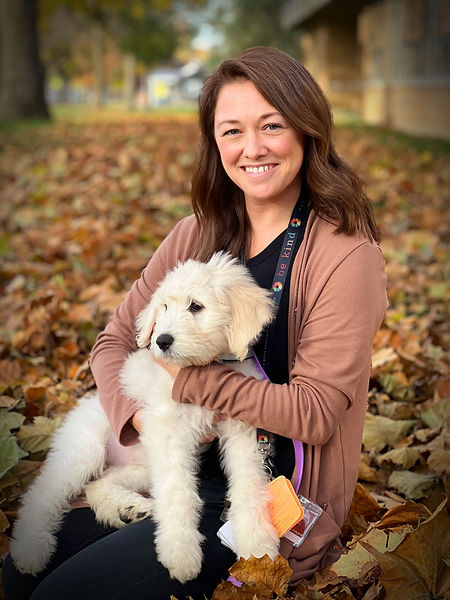
An initiative of Ottawa Elementary School District 141

Heather Jackson & Daisy
Being Seen, Being Heard, and Keeping Safe
By Lisa Cannon
“I do anything that will support better outcomes for our students. It is about reducing any barriers that students have to education.”
Heather Jackson is the school social worker at McKinley. It’s her job to keep an eye on the social-emotional development and mental health of all of our children. Any time a kid is having an issue at school, or at home, I’m “their girl.”
She rattles off just some of the various roles she plays: works alongside classroom teachers, connects with families, runs a life skills program which helps students with a variety of disabilities, works with deaf and hard of hearing students, liaises with community providers, and educates the general public. “Oh, is that all,” we remark with tongue firmly in cheek. Ms. Jackson sums it up this way: “I do anything that will support better outcomes for our students. It is about reducing any barriers that students have to education.”
No two days are the same. Heather works with some students one-on-one. If students have an Individualized Education Plan (IEP), that often includes a social work component and she is involved. She also goes into classrooms and does lessons aimed at boosting students’ social-emotional development. They draw on a curriculum developed by Yale University. Pointing to a poster in the back of the room, she says: “That’s a mood meter back there. It helps them identify their emotions and kind of build their emotional intelligence.” The team recently added a social-emotional facilitator whom Heather notes has been really “awesome.”
Given her energy and enthusiasm, it’s hard to believe that this is Ms. Jackson’s ninth year as a school social worker, her third at McKinley. She actually did her school internship at this school as well (Heather studied at Eastern Illinois University and Aurora College). She grew up in Ottawa and went to school at Jefferson. Sometimes she works alongside teachers that she had when she was a kid. The transition can be a little weird at first, she notes, like learning to call them by their first names!
Heather feels right at home working in a school. She always knew she wanted to work in education in some form. As a child, school was her happy place. She loved the work and her teachers. She loved the order, the structure. Heather says, “I felt cared for, and I always knew that I had a safe place here, and I want to provide that to our kids.”
Her first job in the education field was as a preschool teacher. She found it a bit overwhelming and chaotic, partly because the children had a lot of social-emotional needs. That was what intrigued her more than teaching ABCs. It inspired her to get her master’s degree in social work. She is actually the first member of her family to graduate from college, much less get an advanced degree.
At McKinley, Ms. Jackson wants to make sure that “all of our children feel seen and heard and they matter.” She greets them every morning at the front door, and lately, she has a furry little friend to help welcome the students. Daisy is the school’s new therapy dog. And everyone has fallen in love with her. Heather remarks: “I always say dogs are magic. They walk into a room and everybody’s eyes go straight to that dog. So I’ve watched a lot of our students, but also our staff light up when they see her, and that’s really exciting. And I always tell them, I’m like, she’s still a puppy, so we have to wait. We have to make sure that we’re calm, because if you get excited, she gets excited. So we’ve been working on that and self-regulation... They’ve just blown me away with their ability to stay calm and regulated. So they’re practicing a lot of those wonderful skills already with her.”
To those who might question the value of spending money on a therapy dog (though Daisy was a donation from the United Way), Heather has a succinct rebuttal: “In order for a child to read and write and learn, they have to be prepared mentally.” She elaborates: Students “can’t do any of the other things unless they feel accepted and loved... that’s what these dogs are bringing. And I don’t think you can put a price tag on that. I think just the basic comfort that a dog will bring into a classroom is worth every penny.”
As we are wrapping up, a student interrupts and asks what kind of toy he can get for Daisy. Ms. Jackson replied: Daisy “likes when you write her a letter and read it to her.” He looked pensive for a moment and concluded: “I’m going to get her a bone.”